Related Research Articles
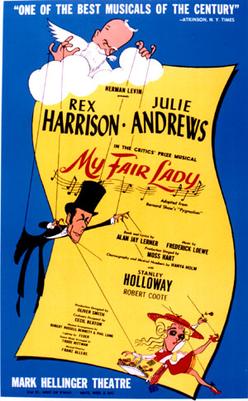
My Fair Lady is a musical with a book and lyrics by Alan Jay Lerner and music by Frederick Loewe. The story, based on the 1938 film adaptation of George Bernard Shaw's 1913 play Pygmalion, concerns Eliza Doolittle, a Cockney flower girl who takes speech lessons from professor Henry Higgins, a phonetician, so that she may pass as a lady. Despite his cynical nature and difficulty understanding women, Higgins grows attached to her.
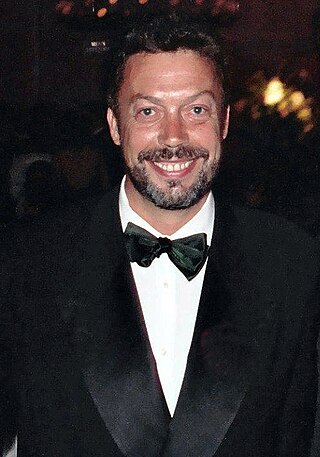
Timothy James Curry is an English actor and singer. He rose to prominence as Dr. Frank-N-Furter in the film The Rocky Horror Picture Show (1975), reprising the role he had originated in the 1973 London, 1974 Los Angeles, and 1975 Broadway musical stage productions of The Rocky Horror Show.
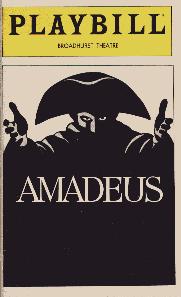
Amadeus is a play by Peter Shaffer which gives a fictional account of the lives of composers Wolfgang Amadeus Mozart and Antonio Salieri, imagining a rivalry between the two at the court of Joseph II, Holy Roman Emperor. First performed in 1979, it was inspired by Alexander Pushkin's short 1830 play Mozart and Salieri, which Nikolai Rimsky-Korsakov used in 1897 as the libretto for an opera of the same name.
A Streetcar Named Desire is a play written by Tennessee Williams and first performed on Broadway on December 3, 1947. The play dramatizes the experiences of Blanche DuBois, a former Southern belle who, after encountering a series of personal losses, leaves her once-prosperous situation to move into a shabby apartment in New Orleans rented by her younger sister Stella and brother-in-law Stanley.

Sir Peter Levin Shaffer was an English playwright, screenwriter, and novelist. He is best known for the plays Equus and Amadeus, the latter of which was adapted for the screen by Miloš Forman, with a screenplay by Shaffer, for which he won an Academy Award.

Thomas Edward Hulce is an American actor and theatre producer. He is best known for his portrayal of Wolfgang Amadeus Mozart in the Academy Award-winning film Amadeus (1984), as well as the roles of Larry "Pinto" Kroger in Animal House (1978), Larry Buckman in Parenthood (1989), and Quasimodo in Disney's animated film The Hunchback of Notre Dame (1996). Hulce's awards include an Emmy Award for The Heidi Chronicles, a 2007 Tony Award for Best Musical as a lead producer for Spring Awakening, an Academy Award nomination for Best Actor for Amadeus, and four Golden Globe nominations.

Rodgers and Hammerstein was a theater-writing team of composer Richard Rodgers (1902–1979) and lyricist-dramatist Oscar Hammerstein II (1895–1960), who together created a series of innovative and influential American musicals. Their musical theater writing partnership has been called the greatest of the 20th century.
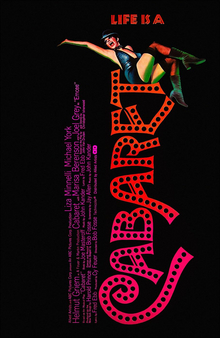
Cabaret is a 1972 American musical period drama film directed and choreographed by Bob Fosse from a screenplay by Jay Presson Allen, based on the stage musical of the same name by John Kander, Fred Ebb, and Joe Masteroff, which in turn was based on the 1951 play I Am a Camera by John Van Druten and the 1939 novel Goodbye to Berlin by Christopher Isherwood. It stars Liza Minnelli, Michael York, Helmut Griem, Marisa Berenson, and Joel Grey. Multiple numbers from the stage score were used for the film, which also featured three other songs by Kander and Ebb, including two written for the adaptation.
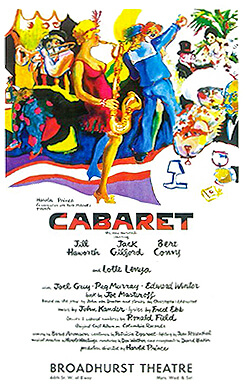
Cabaret is an American musical with music by John Kander, lyrics by Fred Ebb, and a book by Joe Masteroff. It is based on the 1951 play I Am a Camera by John Van Druten, which in turn was based on the 1939 novel Goodbye to Berlin by Christopher Isherwood.
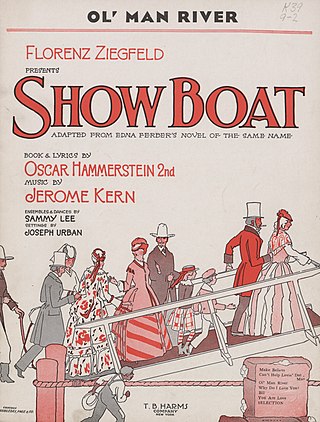
Show Boat is a musical with music by Jerome Kern and book and lyrics by Oscar Hammerstein II. It is based on Edna Ferber's best-selling 1926 novel of the same name. The musical follows the lives of the performers, stagehands and dock workers on the Cotton Blossom, a Mississippi River show boat, over 40 years from 1887 to 1927. Its themes include racial prejudice and tragic, enduring love. The musical contributed such classic songs as "Ol' Man River", "Make Believe", and "Can't Help Lovin' Dat Man".
Margaret Nixon McEathron, known professionally as Marni Nixon, was an American soprano and ghost singer for featured actresses in musical films. She was the singing voice of leading actresses on the soundtracks of several musicals, including Deborah Kerr in The King and I, Natalie Wood in West Side Story, and Audrey Hepburn in My Fair Lady, although her roles were concealed from audiences when the films were released. Several of the songs she dubbed appeared on AFI's 100 Years...100 Songs list.

Frank A. Langella Jr. is an American actor known for his roles on stage and screen. He eschewed the career of a traditional film star by making the stage the focal point of his career, appearing frequently on Broadway. He has received numerous accolades including four Tony Awards, a Drama Desk Award and a Screen Actors Guild Award as well as nominations for an Academy Award, a BAFTA Award, an Emmy Award, and two Golden Globe Awards.
A film adaptation is the transfer of a work or story, in whole or in part, to a feature film. Although often considered a type of derivative work, film adaptation has been conceptualized recently by academic scholars such as Robert Stam as a dialogic process.
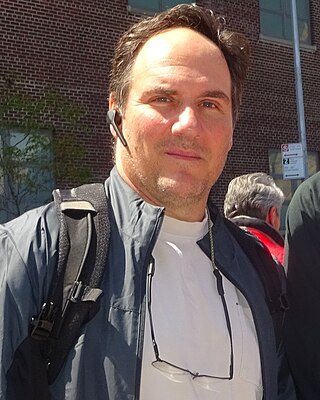
Corey Johnson is an American character actor largely active in the UK, known for his supporting roles in Hellboy, Kingsman: The Secret Service, Captain Philips, The Bourne Ultimatum, Kick-Ass,Ex Machina, the Spooks episode "The Special", the Doctor Who episode "Dalek" and The Last Days of Lehman Brothers as Richard S. Fuld, Jr., the final chairman & CEO of Lehman Brothers.
Maria Friedman is a British actress and director, best known for her work in musical theatre.

A Streetcar Named Desire is a 1951 American Southern Gothic drama film adapted from Tennessee Williams's Pulitzer Prize-winning play of the same name. It is directed by Elia Kazan, and stars Vivien Leigh, Marlon Brando, Kim Hunter, and Karl Malden. The film tells the story of a Mississippi Southern belle, Blanche DuBois (Leigh), who, after encountering a series of personal losses, seeks refuge with her sister (Hunter) and brother-in-law (Brando) in a dilapidated New Orleans apartment building. The original Broadway production and cast was converted to film, albeit with several changes and sanitizations related to censorship.

Toy theater, also called paper theater and model theater, is a form of miniature theater dating back to the early 19th century in Europe. Toy theaters were often printed on paperboard sheets and sold as kits at the concession stand of an opera house, playhouse, or vaudeville theater. Toy theatres were assembled at home and performed for family members and guests, sometimes with live musical accompaniment. Toy theatre saw a drastic decline in popularity with a shift towards realism on the European stage in the late 19th century, and again with the arrival of television after World War II. Toy theatre has seen a resurgence in recent years among many puppeteers, authors and filmmakers and there are numerous international toy theatre festivals throughout the Americas and Europe.

Sleuth is a 1970 play written by Anthony Shaffer. The Broadway production received the Tony Award for Best Play, and Anthony Quayle and Keith Baxter received the Drama Desk Award for Outstanding Performance. The play was adapted for feature films in 1972, 2007 and 2014.
Twelve Angry Men is an American courtroom drama written by Reginald Rose concerning the jury of a homicide trial. It was broadcast initially as a television play in 1954. The following year it was adapted for the stage. It was adapted for a film of the same name, directed by Sidney Lumet, and released in 1957. Since then it has been given numerous remakes, adaptations, and tributes

Diegetic music, also called source music, is music that is part of the fictional world portrayed in a piece of narrative media and is thus knowingly performed and/or heard by the characters. This is in contrast to non-diegetic music, which refers to incidental music or a score that is heard by the viewer but not the characters, or in musical theater, when characters are singing in a manner that they would not do in a realistic setting.